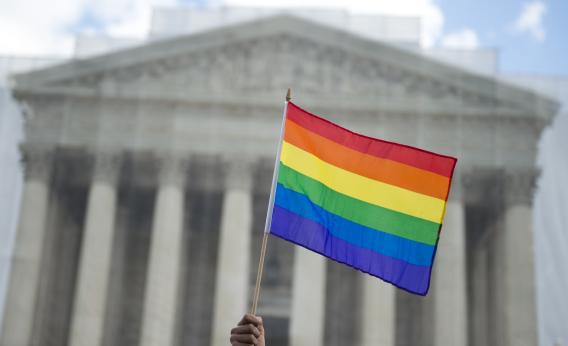The early (and, again, we stress early) analysis of this morning’s Supreme Court hearing on Proposition 8 suggests that the justices are more than a little wary about using the case to issue a sweeping ruling on gay rights. One of several possibilities being talked about by court watchers and legal experts is that the high court could decide to pass on ruling on the case all together, either by simply deciding that it’s too soon to take up the issue or by finding that the plaintiffs don’t have the legal standing they need to challenge the lower court’s ruling that struck down the law. So what happens then?
In short, gay marriage would likely become legal again in California, although the door would be left open for another challenge at a later date.
Prop 8 had previously been struck down in two courts: the first time in 2010 when Judge Vaughn R. Walker of the Federal District Court in San Francisco issued a broad decision that said the U.S. Constitution required California to allow same-sex couples to marry; the second time was in February of last year when the Ninth Circuit Court of Appeals affirmed Walker’s decision on narrower grounds, saying that voters weren’t allowed to revoke the right to marry once it had been established by the state Supreme Court. The two opinions offered slightly different legal rationale, but both came to the same broad conclusion: California voters didn’t have the ability to deny gays and lesbians the right to marry.
The Washington Post explains that if the justices decide that now is not the right time to rule on the issue, that would most likely leave the Ninth Circuit decision in place:
An appeals court struck down the measure, so a decision by the Supreme Court not to weigh in would most likely lead to the resumption of same-sex marriages in California. Such marriages were authorized by the California Supreme Court before voters passed Proposition 8 in 2008.
Things get a little more complicated, however, if the justices decide that Prop 8 defenders don’t have the legal standing to challenge Walker’s ruling. In that case, not only would they have no standing at the Supreme Court level, they’d also retroactively lack it at the circuit level, meaning what stands would be Walker’s initial decision and not the appellate affirmation of it. Regardless, gays and lesbians would again be allowed to walk down the aisle in the Golden State. (Things are a little more complicated because Walker’s decision technically only applies to his district in California, although it would likely be extended to the entire state. If it weren’t, gay couples outside of the district would presumably just plan destination weddings inside of it.)
Now time for the obvious disclaimer: As Obamacare proved, initial readings of Supreme Court oral arguments can often be misleading, so it’s also possible the justices could head in any number of other directions with this case, from upholding Prop 8 to issuing a more sweeping ruling on gay marriage that isn’t limited to California. We’ll have to wait until later this year (likely June) to know for sure.
Watch Slate’s Emily Bazelon Break Down the Prop 8 Case:
***Read more from Slate’s coverage of gay marriage cases at the Supreme Court. Follow @JoshVoorhees and the rest of the @slatest team on Twitter.***
